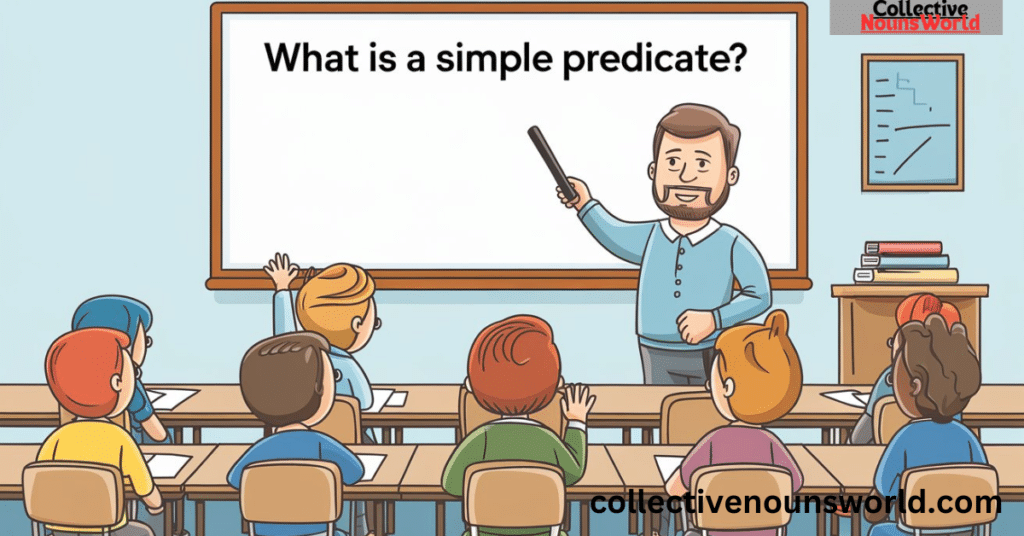Have you ever felt lost in the labyrinth of English grammar? You’re not alone. But fear not! Today, we’re diving into a crucial concept that’ll sharpen your language skills and boost your writing prowess: the simple predicate. By the end of this journey, you’ll be spotting simple predicates like a pro and crafting sentences with newfound confidence.
The Building Blocks of Sentences: Why They Matter
Think of sentences as the DNA of language. Just as understanding DNA helps scientists unravel the mysteries of life, grasping sentence structure empowers you to decode and create meaningful communication. At the heart of this structure lie two key players: the subject and the predicate. Today, we’re shining a spotlight on the latter.
Demystifying the Simple Predicate
What Exactly Is a Simple Predicate?
A simple predicate is the main verb or verb phrase in a sentence that tells us what the subject is doing or being. It’s the action or state of being at the core of your statement.
The Verb’s Starring Role
In the grand theater of sentences, the simple predicate is the star of the show. It drives the action, reveals the state of being, and gives life to your words. Without it, you’d have a stage full of characters (nouns) with nothing to do!
Simple vs. Complete Predicates: Know the Difference
Don’t confuse simple predicates with complete predicates. Here’s a quick breakdown:
| Simple Predicate | Complete Predicate |
| Main verb or verb phrase | Includes the verb and all its modifiers |
| “ran” | “ran quickly through the park” |
| “is singing” | “is singing a beautiful melody” |
Spotting Simple Predicates in the Wild
The One-Word Wonder: Single-Verb Predicates
Sometimes, a simple predicate is just one powerful word:
- The dog barked.
- She laughed.
- Trees grow.
Helping Verbs and Main Verbs: Dynamic Duos
Often, simple predicates team up:
- We have been studying grammar.
- The cake will be baked tomorrow.
- They might have seen the movie.
Tricky Cases: Verb Phrases and Infinitives
Watch out for these sneaky structures:
- To run (infinitive) is not a simple predicate on its own.
- In “She wants to run,” the simple predicate is “wants.”
Simple Predicate vs. Simple Subject: A Crucial Distinction
Quick Review: What’s a Simple Subject?
The simple subject is the main noun or pronoun that the sentence is about. It’s the doer of the action or the thing being described.
How They Work Together
Think of the simple subject and simple predicate as dance partners. They move together to create the basic rhythm of your sentence.
Practice Time! Identify the simple subject and simple predicate in these sentences:
- The curious cat explored the attic.
- Sunflowers grow tall in the summer.
- My brother and I love pizza.
Learn more about 150+Different Shapes Names with pictures | Shape List and Types
The Art of Finding Simple Predicates
The Question Technique: “What’s Happening?”
To pinpoint the simple predicate, ask yourself, “What’s happening in this sentence?” The answer is often your simple predicate.
Eliminating Modifiers and Complements
Strip away all the extra information, and you’ll be left with the core action or state of being.
Example: “The energetic puppy enthusiastically chased the bright red ball across the lush green lawn.” Simple predicate: chased
Dealing with Compound Predicates
Sometimes, a subject performs multiple actions. Each verb or verb phrase in a compound predicate is a simple predicate.
Example: “She smiled and waved at her friends.” Simple predicates: smiled, waved
Common Pitfalls and How to Avoid Them
Don’t Be Fooled by Prepositional Phrases
Prepositional phrases often come after verbs but aren’t part of the simple predicate.
Example: “The cat slept on the windowsill.” Simple predicate: slept (not “slept on”)
Watch Out for Verbals
Participles, gerunds, and infinitives can look like verbs but often aren’t the simple predicate.
Example: “Running a marathon requires training.” Simple predicate: requires (not “running”)
Tackling Inverted Sentences and Questions
In questions or sentences with inverted word order, the simple predicate might not come right after the subject.
Example: “Where did you go?” Simple predicate: did go
Simple Predicates in Action: Sentence Variety
In Simple Sentences
Simple sentences showcase the direct relationship between subject and predicate:
- Birds fly.
- The sun shines.
- Children play.
Within Complex and Compound Sentences
Even in more elaborate structures, simple predicates remain the heartbeat of each clause:
- While the rain poured outside, we enjoyed a cozy evening indoors.
- The chef prepared the meal, and the guests savored every bite.
Learn more about What is the Collective Noun for Cards?
How Understanding Simple Predicates Improves Your Writing
Grasping simple predicates allows you to:
- Craft clearer, more direct sentences
- Vary your sentence structure for better flow
- Ensure subject-verb agreement
- Emphasize actions or states of being effectively
Beyond the Basics: Advanced Concepts
Implied Subjects and Predicates
Sometimes, the subject or part of the predicate is understood but not stated:
- [You] Stop! (Implied subject in imperative sentences)
- She sings better than he [does]. (Implied part of predicate)
Predicate Adjectives and Predicate Nominatives
These special types of predicates use linking verbs to describe or rename the subject:
- The sky is blue. (Predicate adjective)
- My sister became a doctor. (Predicate nominative)
How Simple Predicates Function in Different Clause Types
- Independent clauses: Contain a subject and predicate that can stand alone.
- Dependent clauses: Have a subject and predicate but can’t stand alone as a complete thought.
Mastering Simple Predicates: Practice Makes Perfect
Interactive Exercises
- Underline the simple predicate in each sentence:
- The old car broke down on the highway.
- Clouds gathered ominously in the sky.
- She quickly solved the complex puzzle.
- Create sentences using these simple predicates:
- whispered
- will travel
- has been studying
Real-World Examples
Let’s analyze simple predicates in famous quotes:
“I think, therefore I am.” – René Descartes
Simple predicates: think, am
“That which does not kill us makes us stronger.” – Friedrich Nietzsche
Simple predicate: makes
Learn more about Exploring the Collective Noun for Soldiers:
Self-Check Quiz: Test Your Simple Predicate Prowess
- What’s the simple predicate in: “The talented artist carefully painted a stunning landscape.”?
- Identify the compound predicate in: “She baked cookies and shared them with her neighbors.”
- Find the simple predicate in this question: “When will the train arrive at the station?”
Check your answers
The Bigger Picture: Why This Matters
Improved Reading Comprehension
Understanding simple predicates helps you quickly grasp the main action or state in any sentence, enhancing your overall reading speed and comprehension.
Stronger Analytical Skills
Identifying simple predicates sharpens your ability to break down complex ideas into their core components – a valuable skill in many fields.
More Precise and Effective Writing
With a solid grasp of simple predicates, you can:
- Craft clearer, more impactful sentences
- Vary your sentence structure for better engagement
- Ensure proper subject-verb agreement
- Emphasize key actions or states effectively
Wrapping Up: Simple Predicates, Powerful Communication
We’ve journeyed through the world of simple predicates, from basic definitions to advanced applications. Let’s recap the key takeaways:
- Simple predicates are the main verbs or verb phrases in a sentence.
- They work hand-in-hand with simple subjects to form the core of a sentence.
- Identifying simple predicates improves your understanding of sentence structure.
- Mastering this concept enhances both your reading and writing skills.
Remember, like any skill, identifying and using simple predicates effectively takes practice. Keep analyzing sentences in your daily reading, and consciously craft varied sentences in your writing. Soon, you’ll find yourself navigating the seas of grammar with confidence and ease.
As you continue your grammar journey, consider exploring related concepts like complex predicates, clause structures, or the intricacies of verb tenses. Each new piece of knowledge builds upon the last, creating a robust foundation for masterful communication.
So, what action will your simple predicate describe next? Will you dive deeper into grammar studies? Share this newfound knowledge with others? Or apply it to your next writing project? Whatever you choose, you’re now better equipped to express yourself clearly and powerfully. Happy writing!

Luna Jasper is an experienced blogger with a passion for language and grammar. At **Collective Nouns World**, she shares her expertise in exploring the fascinating world of collective nouns, making learning both engaging and fun. With years of writing and research under her belt, Luna’s insightful articles help readers understand and appreciate the English language.







